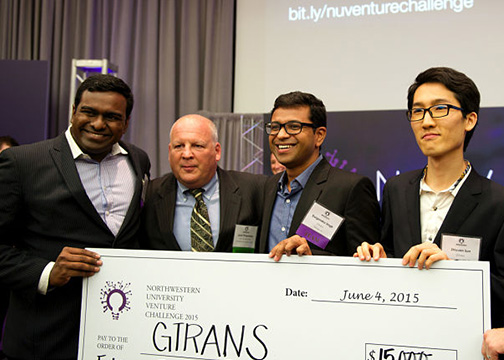Two sustainability- and energy- focused startups won top prizes at the 2015 Northwestern University Venture Challenge (NUVC) competition Thursday. Advanced battery materials startup GTrans and fruit preservation technology startup Hazel Technologies were awarded first and second place respectively in the semifinals. GTrans went on to compete in the final round, where it took home second place and a $15,000 prize.
GTrans aims to improve the safety and reliability of Li-ion batteries, reducing the failure rate of Li-ion battery packs. The technology developed at Northwestern, is a thermal responsive polymer coating on current battery separators and prevents the failure of one battery from impacting surrounding units.
“If a single battery sets on fire, the resulting increase in temperature could start a chain reaction that causes the other batteries to fail,” said Zhiyuan Sun, GTrans team member and Northwestern materials science and engineering graduate student.
Hazel Technologies aims to reduce agricultural waste by offering a technology that controls the freshness of produce at the retail level. Their research estimates that the agricultural industry loses $38.5 billion annually from fruit spoilage.
The technology, called FruitBrite, slows the release of ethylene, an aging agent in fruit that cause it, and the produce around it, to spoil.
Hazel Technologies entered the competition with a substantial portion of their pilot year field testing funded, partly by the Institute for Sustainability and Energy at Northwestern (ISEN). The Institute is committed to funding a diverse portfolio of faculty and student research and initiatives.
Both startups spun out of Northwestern’s 2015 NUvention: Energy course, a campus startup incubator that has mentored cleantech teams since 2011. A third startup from the class, Injoo Networks, which offers a smart building software, also competed in this year’s competition.
NUVC, now in its sixth year, is billed as Northwestern’s premier business pitch competition, seeding promising student startups with capital and mentorship opportunities to grow their ideas.
The grand prize at this year’s competition went to Opticent Health, a medical device startup whose mission is to provide a noninvasive medical imagining instrument that allows ophthalmologists to better diagnose, monitor and treat chronic ocular disease.
The overall corporate sponsor for NUVC 2015 was Wells Fargo, which launched a $10 million Cleantech Innovation Incubator in October 2014. Exelon was the primary sponsor for the green energy and sustainability track of the competition. Cumulatively NUVC awarded $200,000 in seed money to this year’s startups.



